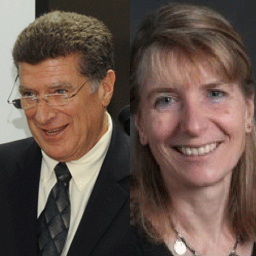 Ted Wachtel and Nicola Preston will co-teach the IIRP's new fully online "gateway" course, "Restorative Practices: The Promise and the Challenge"“Restorative Practices: The Promise and the Challenge,” a new graduate course from the International Institute for Restorative Practices, will be offered for the first time during the Spring 2014 term. This elective course (RP 506) is the first IIRP offering that will be completely online with no pre-requisites.
Ted Wachtel and Nicola Preston will co-teach the IIRP's new fully online "gateway" course, "Restorative Practices: The Promise and the Challenge"“Restorative Practices: The Promise and the Challenge,” a new graduate course from the International Institute for Restorative Practices, will be offered for the first time during the Spring 2014 term. This elective course (RP 506) is the first IIRP offering that will be completely online with no pre-requisites.
IIRP Founder and President Ted Wachtel, who will co-teach the class, said, “I’m excited about the opportunity to produce a really fun, interactive course that engages people in thinking and talking about restorative practices from anywhere in the world. For all of our other beginning courses people have to attend something. There are so many people that have contacted us that want to take a course but aren’t in a position to travel."
He continued, “The course is based around my new book, Dreaming of a New Reality, which really lays out the promise of RP.” He said the main chapters of the book deal with six broad areas of restorative practices application: working with delinquent and at-risk youth, schools, working with victims and offenders in the aftermath of crimes (restorative justice), family use as with family group conferencing, using RP in workplaces, and RP in higher education and college campuses, particularly in residential settings.
“The promise is how RP has been successful in these six areas the IIRP has been working in," said Wachtel. "The challenge will center around articles and discussions on the things that can keep implementation from happening, the things that may stand in the way.”
Co-professor Nicola Preston will help administer the course and serve as the “professor of record.” Preston brings to the table a wealth of experience in restorative practices ranging from policing and justice to school teaching and training going back nearly 20 years.
At about the same time that Wachtel founded Real Justice, the forerunner to the IIRP, and began offering the Real Justice training based on former Australian policeman and restorative practitioner Terry O'Connell's restorative conferencing script, Preston was working for Thames Valley Police in the United Kingdom. She was a trainer for Thames Valley's Restorative Justice Consultancy that collaborated with O’Connell to implement restorative processes in police cautioning for young offenders and respond to internal and external police complaints. Her responsibilities included working with researchers at the Oxford Centre for Criminological Research who did some of the first independent evaluations of restorative practices that would help lay the groundwork for a nationwide restorative justice program. Preston also was a trainer for the IIRP's UK affiliate, now called IIRP Europe, and was a founding member of the Restorative Justice Consortium (now the Restorative Justice Council), a national organization in the UK that helped establish national standards for best practices. More recently Preston worked for five years as a classroom teacher and special educational needs coordinator using restorative practices in a high needs school before returning to the IIRP.
“Working for the IIRP again," said Preston, "it feels we’re at a real tipping point. The IIRP framework and its explicit nature is just the structure we need to deal with all the difficulties – the disconnected world, the disconnected communities, the difficulties in communication – and build relationships. IIRP is perfectly placed, because of its history, its international affiliates, the quality of the model, to advance restorative practices while maintaining the ethics behind what a restorative approach is all about.”
She added, “I look forward to working with Ted and all his experience and knowledge and creativity. He’s always so passionate about things."
In addition to books and articles, a variety of videos will be used throughout the course, including rare footage from 1994, the year Wachtel first went to Australia to meet Terry O’Connell, researcher and writer John Braithwaite and Marg Thorsborne, a guidance counselor who did the first school-based restorative conferences.
Wachtel said, “People will find it very stimulating. It’s about real stuff, what people are doing with restorative practices and the amazing creativity that’s associated with that. But it’s also about the problems they encounter when getting started anywhere and trying to sustain their work."
Learn more and register for RP 506.

